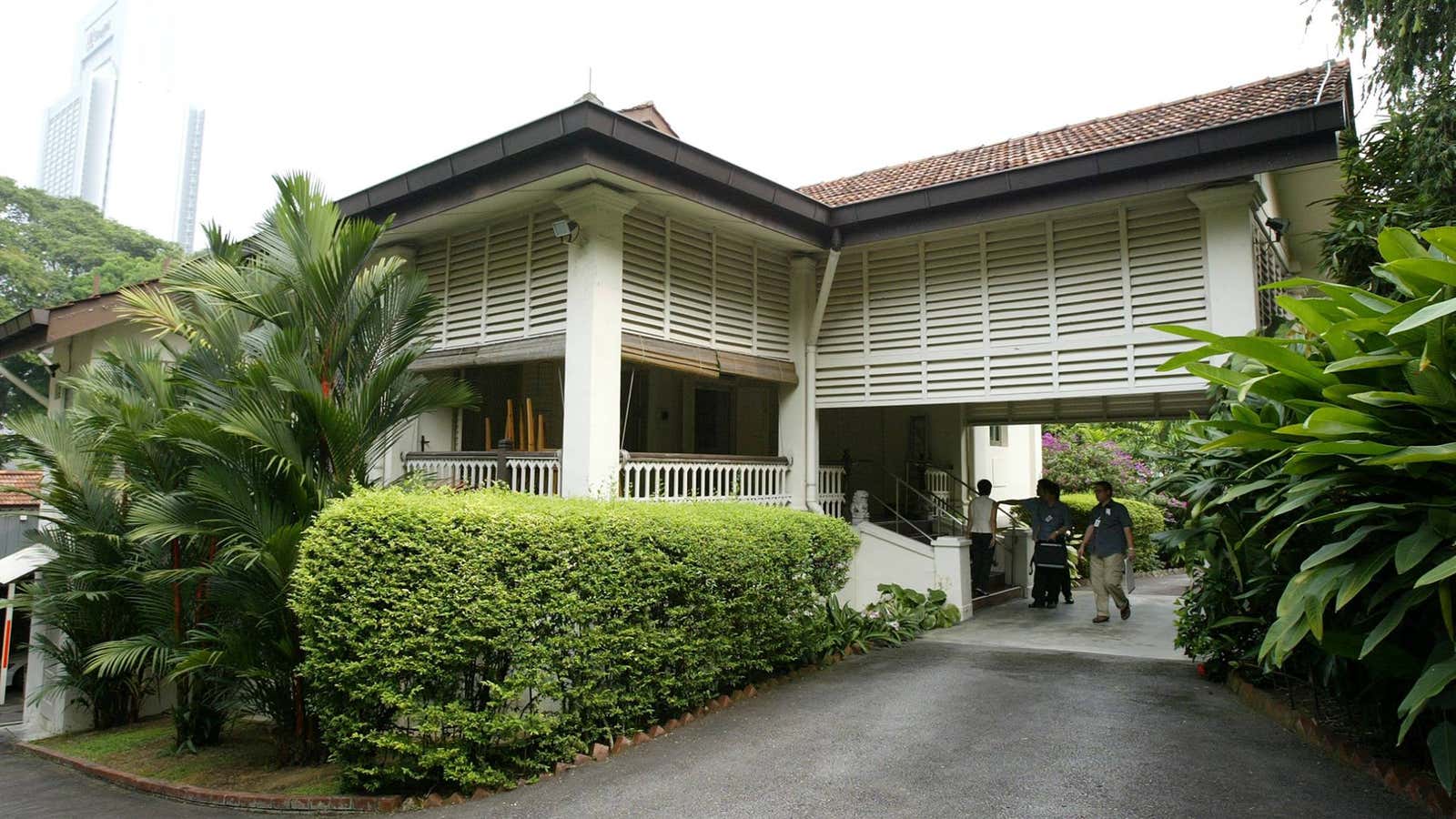A patriarch dies, the family mourns, and then promptly fights over the house. That’s what’s happening in Singapore, only the patriarch was the architect of the nation.
This morning residents of the little red dot woke up to shocking news—Lee Hsien Yang, brother of Singaporean prime minister Lee Hsien Loong, issued a statement (.pdf) suggesting he will enter self-exile. In a six-page letter co-written with his sister, Lee Wei Ling, he said he would leave the state for the “foreseeable future,” citing his brother Loong as the “only reason for [his] departure.”
“We feel big brother omnipresent,” they write.
The siblings contend Lee Hsien Loong has sought to establish a dynasty-like rule over Singapore following the passing of their father Lee Kuan Yew—Singapore’s revered former leader, responsible for its astonishing economic advancement and deeply mourned upon his death in 2015. For evidence, they point to the fate of the family real estate. Lee Kuan Yew stated in his will that upon his death, the family’s home at 38 Oxley Road ought to be demolished. Lee Hsien Loong, however, wants to preserve the property, and perhaps move in.
The siblings say they believe this marks a concerted effort to build a dynasty-like ruling family in Singapore, and runs contrary to their father’s wishes. They write:
We believe, unfortunately, that Hsien Loong is driven by a desire for power and personal popularity. His popularity is inextricably linked to Lee Kuan Yew’s legacy. His political power is drawn from his being Lee Kuan Yew’s son. We have observed that Hsien Loong and Ho Ching [his wife] want to milk Lee Kuan Yew’s legacy for their own political purposes. We also believe, based on our interactions, that they harbour political ambitions for their son, Li Hongyi.
Lee Kuan Yew moved into his house on 38 Oxley Road in 1945. The property remained his home until his death.
His desire to demolish the property after he died is well-documented. In a 2011 interview with local paper the Straits Times, he cited the high cost of maintenance as one reason to tear it down, adding that he doubted his family would remain attached to it. “I don’t think my daughter or my wife or I, who lived in it, or my sons who grew up in it will bemoan its loss. They have old photos to remind them of the past,” he said. He also appeared not to want the house to become a political shrine—or a nuisance to neighbors.
It’s been over two years since Lee Kuan Yew’s death, though, and the house still stands. In December 2015 prime minister Lee Hsien Loong announced that he and his brother Hsien Yang would donate the value of the house to charity. But in today’s letter, Lee Hsien Yang alleges that his brother’s public hand-wringing belies private efforts to keep the house for himself.
Lee Hsien Loong issued a response to the letter on Facebook, stating the allegations left him “deeply saddened.”
[protected-iframe id=”baeecae9dfd22495f93e548ba9d328a4-39587363-88027907″ info=”https://www.facebook.com/plugins/post.php?href=https%3A%2F%2Fwww.facebook.com%2Fleehsienloong%2Fposts%2F1505690826160285&width=500″ width=”500″ height=”282″ frameborder=”0″ style=”border: none; overflow: hidden;” scrolling=”no”]
The house, of course, is a just material symbol of the siblings’ broader concerns about the brother who formally took office as prime minister in 2004. Despite being an electoral democracy, Lee and his Peoples’ Action Party (PAP) carry an unusual degree of power in the country. The party has maintained an overwhelming majority in the legislature since the 1960s, and also controls the electoral process and the judiciary—which prevents meaningful opposition from ever forming.
Will the Lee siblings’ statement have much of an impact? Such a damning indictment of the country’s ruler, coming from his own family, remains unprecedented in Singapore. But dissent in Singapore tends to not rile up the public the way it does elsewhere. When YouTube personality Amos Yee was detained in 2015 for criticizing Lee Kuan Yew, he earned plenty of attention from the international media, but not much sympathy from ordinary Singaporeans. Even if the Lee siblings’ concerns about nepotism in government are valid, they won’t have much impact unless other people share them.
